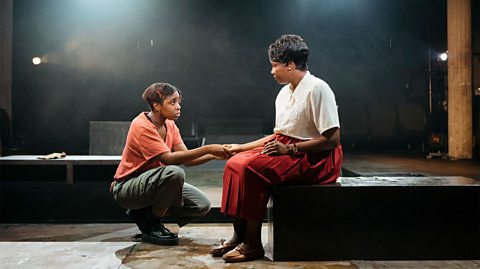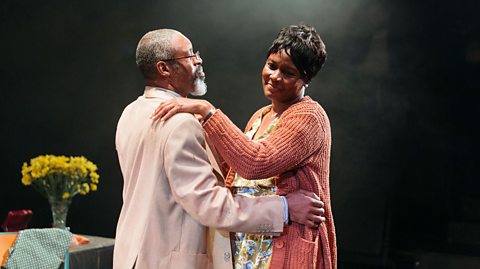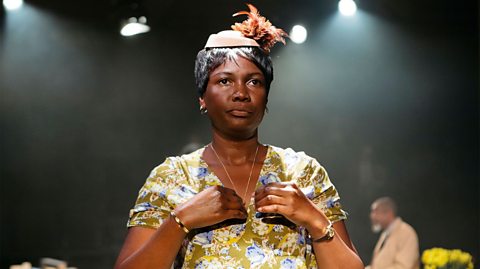Key points

Three of the main themes in Leave Taking are family, culture and education.
The author, Winsome Pinnock, creates the theme of family through developing realistic characters with complex relationships.
Ideas about culture are used to explore conflict and identity in the play.
Education is important to Enid and she tries to share that belief with her daughters.


Remember
A theme is a big idea that can be found throughout the text. It is created by repeating ideas at different points in the text.
Major themes can overlap with other smaller themes and ideas. For example, the theme of education can include the smaller themes of poverty or ambition, as education in the play is closely tied to wealth and a successful career.
Family
The playãs focus on three close-knit members of the same family means that this theme runs throughout the play.
Sibling relationships

There is a sisterly bond between Del and Viv. Despite their different attitudes towards school, work and even their own mother, they have a close and often playful relationship.
Viv covers for Del when Del loses her job, and they both joke about Maiãs "powers" in Scene One. Even when they fight after Viv reveals she has walked out of her A-level exam, Delãs frustration towards Viv is because she wants Viv to fulfil her potential and have a better life.
Viv also gives the money meant for her university studies to Del, in a protective gesture that reverses the traditional roles of older and younger siblings. Viv recognises that Del will need the money for her child more than she will need it for university.
At the end of the play, Del and Viv have become more tolerant of their different attitudes and are closer than ever before.

Parents and their children
The play also explores parent-child relationships in different ways.
Enid sees her children as a reflection of herself. She tells Mai about her "shame" when she was once called to pick up Del, who was caught shoplifting.
Enidãs visits to Mai are focused on her sense of responsibility towards her daughters, even though Del believes that Enid ãhatesã her.
Enid does not speak about Del after she moves out, but then feels a paralysing guilt about the relationship with her own mother, who also treated Enid coldly when she left home.
Enidãs relationship with Viv is stronger, but Viv feels pressure from her mother to do well academically.
Absent families
Pinnock shows the differences between present family and family abroad: Brod and Enidãs lives in the UK are a stark contrast to their familiesã lives in Jamaica.

There is tension with Enidãs family because those living in poverty in Jamaica seem to envy the supposed wealth of those living in the UK. Enid is expected to send money back home to her family, even though she works two jobs and appears to be relatively poor herself.
Brodãs wife and children have returned to Jamaica, and he seems to feel that it is almost impossible to be reunited with them. Unlike Enid, he thinks that many aspects of his familyãs life in Jamaica are like living in paradise.
Question
When looking at a theme, think about what messages the writer might be exploring through this theme. What is Pinnock trying to convey about family?
Family relationships are presented as complex and changeable, as seen between Enid and Del, and Brod and his family.
There seems to be an inextricableImpossible to separate from. link between family and home. Many of the discussions about family are linked to sharing, or not sharing, the same physical space to live in.
Children are often aware of the pressures on them to have a better life than their parents did. Viv tells Enid: "I canãt live your life for you. I don't know what you want".
Culture
This theme is often the impetusSomething that causes an event or change. for both inner and external conflict in the play, but it is also something which can create a feeling of safety and belonging.
Generational clash
There is a clash between the first-generation and second-generation experiences of growing up.
Enid and Brod are first generation immigrants. They remember their childhood in Jamaica and can compare it to the way they live now in England.
Del and Viv are second generation, which means they were born and raised in England, and have never been to Jamaica. This means that there is sometimes a clash between their attitudes and those of the older generation because they have experienced different sets of values and ideals.
An example of this is what the adults and teenagers see as an 'improved' life: for Enid, it is university studies and a well-paying job, but for Del, it is having independence and being able to socialise freely. Brod makes fun of this when addressing Viv, putting on an accent to suggest that a "Hinglish girl" should be "out with her boyfriend every single night like all the other Hinglish girls".
Customs and traditions
The customs and traditions which are relied upon in new places are also important in the play.
Maiãs place in the narrative is to act as a bridge between Caribbean and English culture. Although Mai has lived in Deptford for many years, itãs clear that Mai preserves many aspects of Jamaican culture, without being changed by the English world around her.
For Enid, Maiãs bedsit is a safe place that feels more like home than her own flat in north London, and a place to find guidance and support for living in a culture that is different to the one she grew up in.
When Enid opens up to Viv about her childhood, this could also be said to be part of an oral traditionA way of passing down a communityãs knowledge through word of mouth, without anything written down. ã something that Brod encourages Enid to do throughout.

Religious and spiritual beliefs
Ideas about culture are reflected in the religious and spiritual beliefs discussed in the play, such as Maiãs ObeahThe name given to a series of African spell-casting and healing traditions. practices and readings and Enid's belief in Christianity.
Enid scrubs her house clean and wears her Sunday best in anticipation of a visit from the Christian pastor and his wife, and sings along to a traditional hymn as she clears up after their visit. Although she visits Mai for Obeah readings, she is conflicted about this as she tells Brod that she has "made a covenant with God".
Maiãs values and actions are traditional, especially in her rejection of Western medicine. Mai repeats the line, "What doctor know about a Black woman soul?" in Scene Six and Scene Eight.
Spirituality is the backdrop to Delãs character development. She rejects it at the start of the play, but gradually becomes immersed in Maiãs culture and becomes an Obeah practitioner by the end of the play.
Identity and belonging
Culture in the play is also about a sense of belonging.
Viv becomes increasingly disinterested in the English literature she is studying as she cannot see herself in the writing.
Brod has paid for British citizenship, but his sense of permanence is still fragile: he believes that he will never be fully accepted by England because of his race and background.
Brod has experienced racism, as has Del, who despite her British upbringing is treated badly. Del says her manager at the burger bar "talks to me as if I canãt speak English".
Brod also uses patoisA form of language or dialect different to the standard or official language of a country. frequently as a way of asserting his Caribbean identity.
Mini quiz
Education
Pinnock shows us several interpretations of this theme across the play.
Opportunity
Enid believes in education as a way of saving her family from poverty. She pushes Viv academically in the belief that Viv will have greater opportunities the more that she studies. Enid does not want Viv to have to work two jobs, like she does.
Delãs opposition to formal education clashes with Enid's view and this causes problems in their relationship, especially as Viv wants to make Enid happy.

Power
Several of the characters assume Viv has some priviledgeAn advantage given to a particular person or group. over them because of her education.
Brod blames colonialismControl by one country or power over a different country or people.ô ô In this context, Brod is referring to Britainãs historical ownership of Jamaica. as the reason that Viv will be going to university while her cousins in Jamaica will not.
Delãs anger when Viv walks out of her exam is expressed in Delãs belief that Viv is throwing away a form of power that comes with academic success.
Brod and Enid also associate a lack of education with a lack of power. They are disappointed at their lack of formal educational achievements. Brod tells Viv that Enid failed her postmistress exam, and now ãwants betterã for Viv.
More positively, Viv's choice to read Black Studies at the end of the play could symbolise a way of taking back power over her own education and culture.

Representation
The characters have experienced EurocenticFocused on European culture or history, ignoring the rest of the world. education. For Enid, Mai and Brod, the British curriculum they studied in school in Jamaica reflected a different culture to the one they were living. Viv and Del, who have been entirely educated in England, have not been taught about Obeah or Caribbean culture.
Brod is surprised that an "A-class student" like Viv does not know anything about Nanny a the Maroonsan eighteenth-century Jamaican woman who led a war against British authorities in Jamaica. She is also mentioned in the poem ãChecking Out Me Historyã by John Agard.. This creates a conflict between the knowledge of Jamaican history and culture valued at home and the knowledge that is valued in school. By later choosing a course which centres her racial identity, Viv rejects the power that traditional studies in English Literature once had over her.
Question
In Scene Six, Enid explains to Mai that she is not worried about Viv because:
They can't take you education away from you.
What are the effects of Pinnockãs language choices in this quotation?
Pinnock uses simple pronouns here to highlight some key messages.
"They" is an allusion to wider English society, suggesting that education and the qualifications Viv will gain through studying are more powerful than any possible discrimination.
The repetition of "you" also reinforces the idea that Viv alone is responsible for her success, and that her education is an important part of her identity.
The motif of ãleave takingã

A motif is an idea that is repeated throughout a story to highlight a larger theme.
The most powerful and important motif that Pinnock uses is the motif of leaving a family, which is echoed in the title of the play. Each character has an experience of leaving home, and although this motif is most closely linked to the theme of family, its presence is also important to understanding the themes of culture and education.
Examples of this are:
Enid and Brod leave their family homes in Jamaica to travel to England for a better life
Brodãs wife and children leave him to return to Jamaica
Del leaves Enidãs home after their argument
Maiãs son leaves and becomes estranged from her
Viv leaves home to attend university.
Traditionally, the meaning of ãleave takingã is ãthe act of saying goodbyeã. In all of the examples used in the play, the actual farewells either happen offstage or do not happen at all, and the ãleave takingã has far-reaching and emotional consequences.

Question
How might you argue that Delãs example of leave taking in the play could be interpreted as both positive and negative?
Del leaving Enidãs home could be a negative example of leave taking, as it breaks up the family and leaves Del in a difficult situation.
On the other hand, it could be interpreted as a positive act, as it forces Del to become more independent and gives Enid the space to reflect on their relationship.
Quiz
Test your knowledge of the themes in Leave Taking by completing this multiple-choice quiz.
More on Leave Taking
Find out more by working through a topic
- count1 of 5

- count2 of 5
